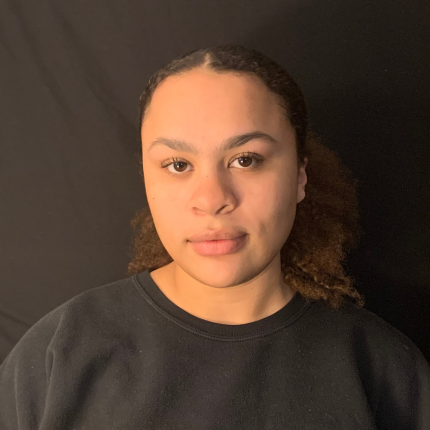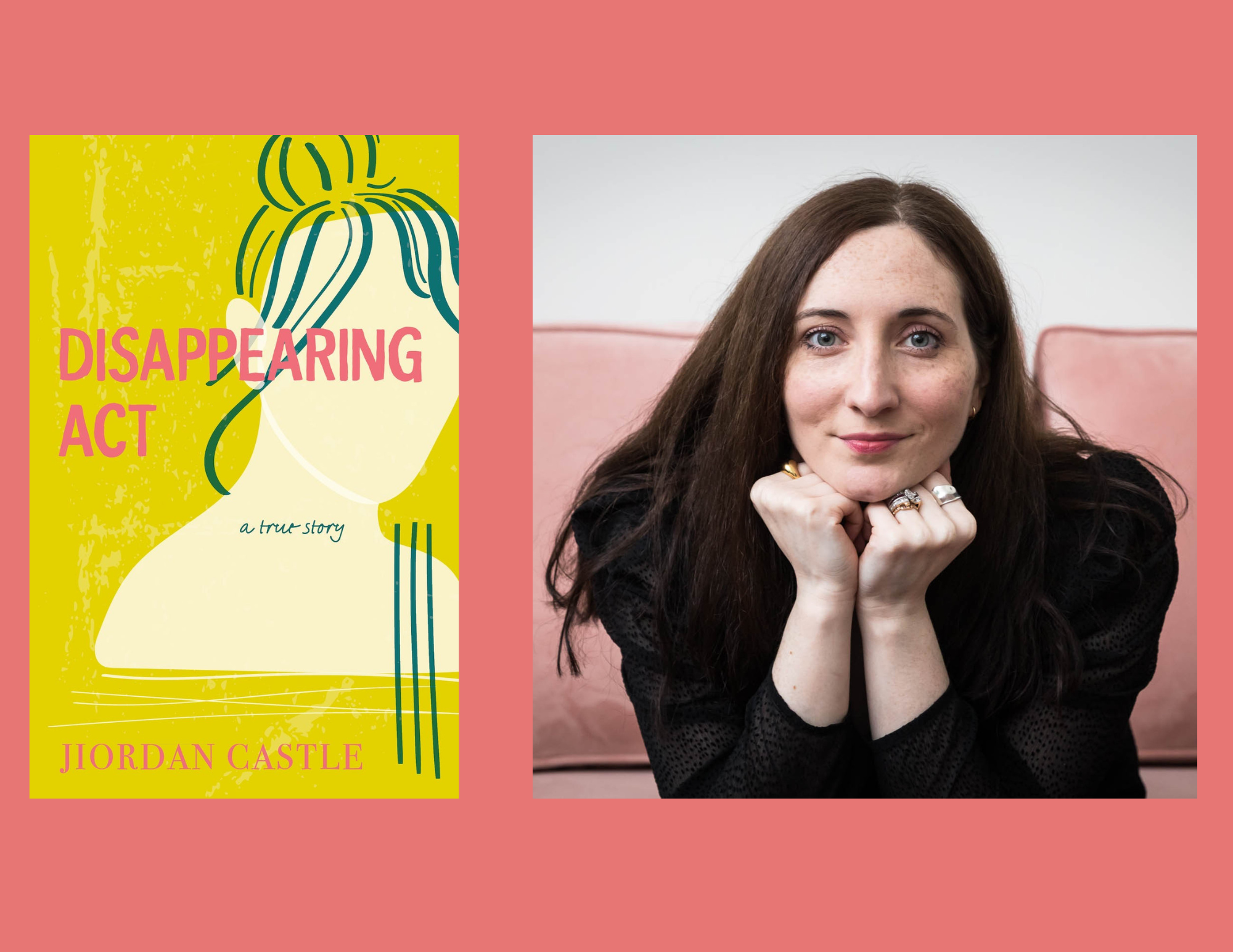Jiordan Castle is a New York-born writer who currently lives in Philadelphia. She received her MFA in Poetry from Hunter College and published a chapbook, All His Breakable Things, in 2020. Her work can also be found in HuffPost, The New Yorker, and other notable publications.
I had the pleasure of speaking with Castle about her upcoming memoir in verse: Disappearing Act. A volatile collection of images inspired by the author’s adolescence, this memoir focuses on Castle’s relationship with her father and uncovering the secrets of her youth. The collision of childhood experiences with enlightened reflections makes this memoir a beautiful journey of self-discovery as Castle teaches us to cope with that which we don’t fully understand.
Diamond Warney: How long did the writing process take? Have you been writing this book consistently, or did the poems come about sporadically?
Jiordan Castle: I’ve been writing toward this book for the last decade. While the period of my life I write about in the book began when I was barely a teenager, the oldest piece in the book was first drafted when I was an undergrad at the University of San Francisco. But that sat in a vacuum by itself for a long time! Realistically, the book in its final form was written in a few drafts over the course of a year and a half.
DW: A lot of the pieces in this collection could easily stand alone. Were any of the poems written individually, or were they all written to be a part of a larger work?
JC: That’s so lovely of you to say. Disappearing Act actually began as a traditional poetry collection! While that’s not the book or the proposal that ultimately sold, the seeds of that collection made their way into the final book… I think it’s much better for it. Sometimes you write to teach yourself what’s possible. It’s important to me that young writers in particular understand that what gets “finished” first doesn’t have to be what gets published. Often, it’s not!
DW: What is the most difficult part of your writing process?
JC: I wrestle with the blank page. It’s always easier—for many of us, I suspect—to revise something that exists. When you get to that point, when there’s something to play with, you’re at least in conversation with yourself. I think getting started is sometimes the most difficult part for me. And with this book in particular, revisiting the past and my own family dynamics was painful at times. I had to push myself past my own feelings of being a villain for simply writing the book at all—for sharing personal stories and narratives that I don’t exclusively own, even if the memories are mine.
DW: What was your editing process like? How did you decide which poems to use?
JC: Fortunately, I have an editor who is worlds wiser than I am, whose job it is to see the forest and its trees. When you’re writing a memoir, it can get thorny in terms of what to keep and what to cut. You can become attached to an idea or a person that you might otherwise be less precious about, were it a work of fiction. Every draft became better, cleaner, more relevant and accessible. So much of that is because my editor, Joy Peskin, felt like a creative partner to me.
DW: You mentioned that you used to write poems when you were younger but they were lost in the move. Are any poems in the book inspired by poems you wrote during that time?
JC: I love this question. I think this book was co-authored by the child I was back then. I really do. I think many of the poems in the book where I provide a lot of interiority—a lot of thinking out loud, bringing readers into the formerly private corners of my mind—come from the part of me that first felt empowered by the act of writing.
DW: What was the emotional journey behind this book? How did you decide that your father’s incarceration was not something to be ashamed of but something beautiful, something that poems should be about?
JC: I really appreciate your perspective. There are so many children and adults with worse experiences than mine in the realm of incarceration—especially, disproportionately, people of color. To that end, my hope is that the book acts as a gateway, a single resource, for people who can relate even a little bit. I can only tell my story, and I want it to be one of compassion, not shame. There are too many young people without support systems, who are just trying to figure out who they are while juggling (or dodging) outside influences. If even one young person reads Disappearing Act and feels less alone, that’s it, that’s everything. That thought kept me going when I periodically lost myself in the book.
DW: The motif of a disappearing act, of being simultaneously present and absent, is incredibly powerful. How did you come up with the metaphor? What told you that it should be the title?
JC: I’ve always loved magic. There’s a connection in my father going to prison for fraud, essentially, and the deep love I have for what I refer to as “deception for good” (illusions, sleight of hand, etc.). One thing that’s struck me when it comes to disappearance in magic, be it a coin or a whole human, is that we’re focused on what’s not there. The outline. The shadow. The book, to me, is my experience of being that disappeared thing hiding in plain sight, wanting to be found, but also another kind of con related to my father. Away, but not gone.
DW: When did you know you wanted to write this book? Has writing and publishing this book changed any feelings about yourself at that time in your life?
JC: I thought this particular book would happen many years from now and in a different form. But this book is what I always wanted, ever since I was a teenager in a bookstore trying to find something that felt like my story. Something to guide me or at least see me. I had to write it to find it. After years of writing poems and essays and even publishing a chapbook that talked around this experience, I found my way to this book. It was like walking my younger self home. Writing the book knowing it would be read by strangers gave me massive, massive anxiety, but it also gave me the smallest inkling of peace. The story is mine, but the book belongs to everyone now. It’s terrifying, but it’s also freeing.
DW: I love the contrast between normal adolescent issues and serious, real-world events. How did you navigate this balance of light and heavy?
JC: I credit so much of that balance, quite literally, to the reality of my teenage years. As a teenager, everything is new. The stakes are high, or they at least feel that way, because you’re at the beginning of so many different journeys rolled into one. You might have first experiences with love and friendship and grief and failing and winning. I was a lonely kid, even when I had wonderful friends to share weekends and phone calls and everything with. Having depression and anxiety can really distort your sense of self, but being loved by people who will stick by you and ride the waves makes the difference.
DW: What is your next step as a writer? Are you planning to write more books?
JC: Yes! I’m at work on more poems and I have a couple of mapped-out novels competing for my time and attention. Because Disappearing Act was pulled from a hard time in my life, it took a lot of emotional energy to write it and even to think about it. Now, I’m excited to write into new worlds and ideas. If I’m not writing, I’m thinking about writing. I wouldn’t change that for anything.
Disappearing Act is set to release on August 15 of this year and is available for pre-order. You can find more information on Jiordan’s website here.

Diamond Warney is a second-year Drexel student studying English and Law. She enjoys reading poetry and watching low-budget horror movies. After graduation, she hopes to earn her J.D. and work in immigration law.
